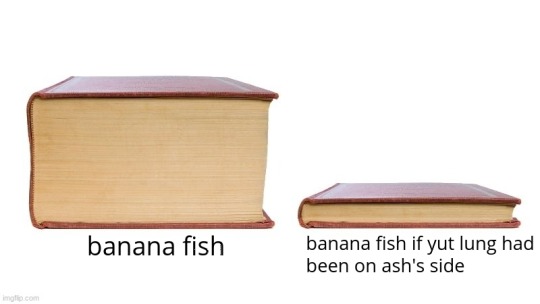hiya i'm spin and banana fish slaughtered my soul / likes and follows from spinshivers / this blog is under heavy construction!
Don't wanna be here? Send us removal request.
Photo
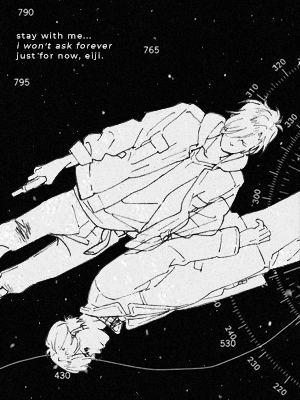
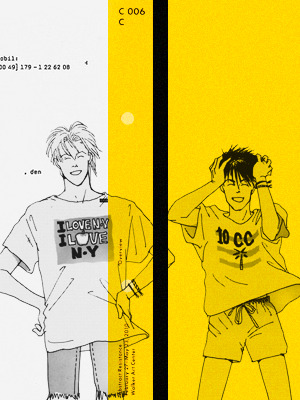
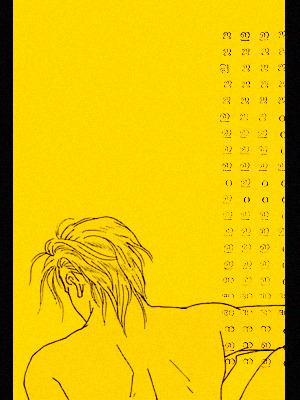
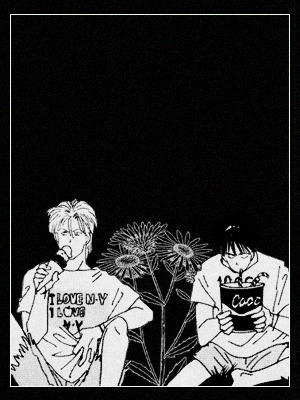
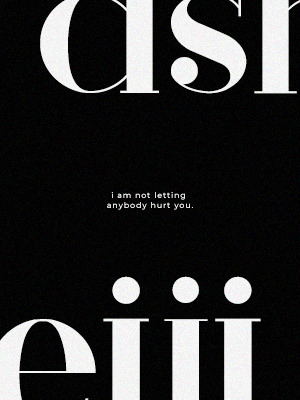
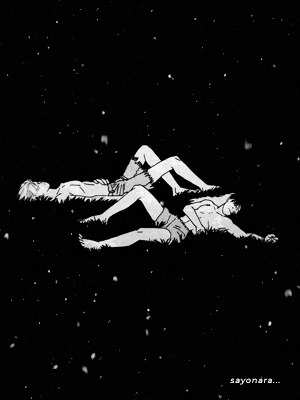
Ash, where did you go? You said “sayonara” to me the other night. That’s one japanese word i should never have taught you.
2K notes
·
View notes
Photo











disclaimer: no actual thought went into this
1K notes
·
View notes
Text

i rly wanna know what’s going on off-frame here
744 notes
·
View notes
Text
I was talking about my headcanon of Eiji’s birthday being in April/Aries so he’s the lamb (or ram in this case) to Ash’s lion (plus I like the dynamic of Ash being this strong burning fire at times and Eiji being fire also but like a warm hearth fire and then they melt into each other as one fire/soul)...... and it led to me thinking about how much he is actually a Wild Child
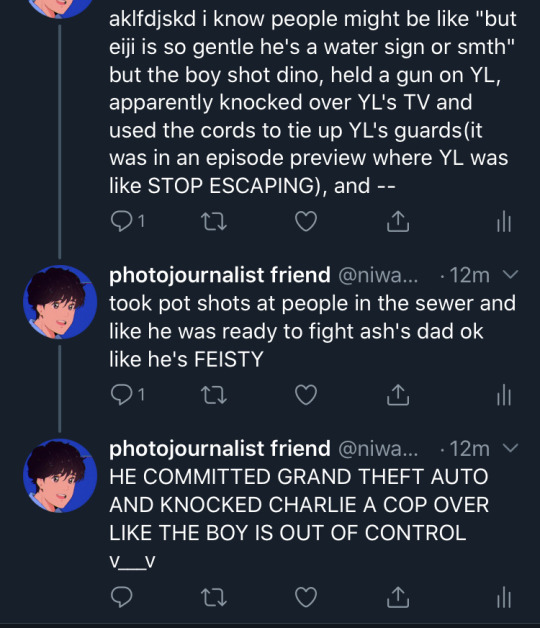
98 notes
·
View notes
Photo
this picture is the very definition of
:D
D:


“Remembrance"
Keep reading
6K notes
·
View notes
Photo

aslan’s dream
Patreon | pixivFANBOX | Gumroad | Commission | Ko-fi
8K notes
·
View notes
Photo

Яркими красками мир разукрасит заря, Если, дожив до утра, не сломаю себя. И падший ангел говорит мне - выбирай: Подлость, предательство, деньги или же рай.(с) AK
224 notes
·
View notes
Text
Ash as Jack o’ Lantern
My dad made a Jack o’ Lantern for me on Halloween night.
I wore it to go trick-or-treating.
I went to hide in the forest alone to scare Griffin.
it was pitch dark and there were eerie noises all around.
I got scared and turned to go home when a huge pumpkin came staggering my way.
I realized later on it was just my reflection on the windshield of a car.
This anecdote Ash tells Eiji in episode 11 summarizes Ash as a character and his difficult relationships with his parental figures throughout the series.
This meta will try to show this.
Keep reading
85 notes
·
View notes
Text
Banana Fish and the MBTI
As requested by @aspoonofsugar.
The Myers-Briggs Personality type is older than the Enneagram, and consists of sixteen types based on four different pairs of personality traits: Introversion vs. Extroversion; Sensing vs. Intuition, Feeling vs. Thinking, and Perceiving vs. Judging. To be clear, none of these categories are black and white–for example, all Feelers are capable of using logic, and Thinkers have feelings and care about people–but it’s a cool way of understanding personalities.
I’m not going to do every character, but simply the characters I think are most important and the ones for whom I have the most information to analyze (some is def guesswork). :P Also, this is just my opinion and definitely open to debate! MBTI isn’t a science; it’s just a fun tool.
Ash Lynx: INTJ, “The Architect”
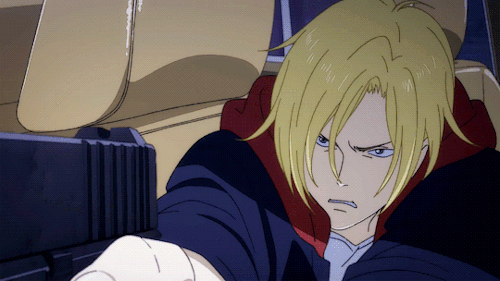
It’s lonely at the top, and being one of the rarest and most strategically capable personality types, INTJs know this all too well… People with the INTJ personality type are imaginative yet decisive, ambitious yet private, amazingly curious, but they do not squander their energy…
INTJs are simultaneously the most starry-eyed idealists and the bitterest of cynics, a seemingly impossible conflict.
Eiji Okumura: INFP, “The Mediator”
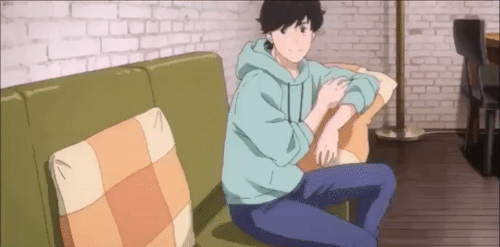
INFP personalities are true idealists, always looking for the hint of good in even the worst of people and events, searching for ways to make things better. While they may be perceived as calm, reserved, or even shy, INFPs have an inner flame and passion that can truly shine…
INFPs are led by the purity of their intent, not rewards and punishments.
Shorter Wong: ESFP, “The Entertainer”

No other personality type is as generous with their time and energy as ESFPs when it comes to encouraging others, and no other personality type does it with such irresistible style…
Though it may not always seem like it, ESFPs know that it’s not all about them – they are observant, and very sensitive to others’ emotions. People with this personality type are often the first to help someone talk out a challenging problem, happily providing emotional support and practical advice.
Sing Soo-Ling: ESFJ, “The Consul”
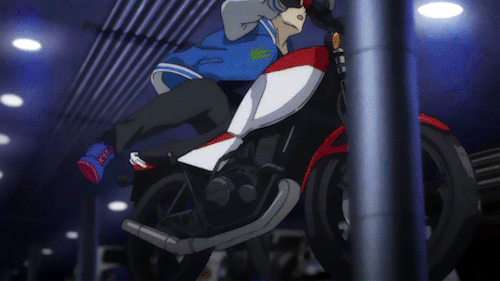
ESFJs are altruists, and they take seriously their responsibility to help and to do the right thing. ESFJs truly enjoy hearing about their friends’ relationships and activities, remembering little details and always standing ready to talk things out with warmth and sensitivity. If things aren’t going right, or there’s tension in the room, ESFJs pick up on it and to try to restore harmony and stability to the group.
Lee Yut-Lung: INFJ, “The Advocate”

he’s an infj but a very unhealthy one
INFJs indeed share a unique combination of traits: though soft-spoken, they have very strong opinions and will fight tirelessly for an idea they believe in. They are decisive and strong-willed… INFJs take great care of other’s feelings, and they expect the favor to be returned…
The passion of their convictions is perfectly capable of carrying them past their breaking point and if their zeal gets out of hand, they can find themselves exhausted, unhealthy and stressed. This becomes especially apparent when INFJs find themselves up against conflict and criticism – their sensitivity forces them to do everything they can to evade these seemingly personal attacks, but when the circumstances are unavoidable, they can fight back in highly irrational, unhelpful ways.
Blanca: ESTJ, “The Executive”
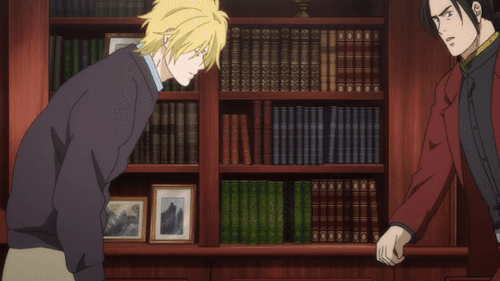
ESTJs are representatives of tradition and order, utilizing their understanding of what is right, wrong and socially acceptable to bring families and communities together…
The main challenge for ESTJs is to recognize that not everyone follows the same path or contributes in the same way.
Max: ESFP, “The Entertainer”

People with this personality type are often the first to help someone talk out a challenging problem, happily providing emotional support and practical advice. However, if the problem is about them, ESFPs are more likely to avoid a conflict altogether than to address it head-on. ESFPs usually love a little drama and passion, but not so much when they are the focus of the criticisms it can bring.
(this sounds very much like how max deals with jessica when their marriage is breaking up)
Cain Blood: ENTP, “The Debater”
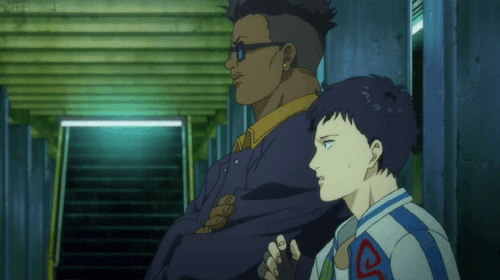
Playing the devil’s advocate helps people with the ENTP personality type to not only develop a better sense of others’ reasoning, but a better understanding of opposing ideas…
Treating others as they’d be treated, ENTPs have little tolerance for being coddled, and dislike when people beat around the bush, especially when asking a favor.
This seems pretty accurate to Cain’s first meetings with Ash and Arthur.
Jessica Randy, ESTJ, “The Executive”
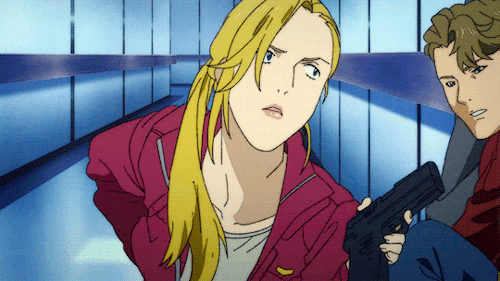
I went back and forth between ESFJ and ESTJ for her before settling on the latter.
ESTJs don’t work alone, and they expect their reliability and work ethic to be reciprocated – people with this personality type meet their promises, and if partners or subordinates jeopardize them through incompetence or laziness, or worse still, dishonesty, they do not hesitate to show their wrath…
The main challenge for ESTJs is to recognize that not everyone follows the same path or contributes in the same way.
54 notes
·
View notes
Text
On Banana Fish’s Ending
Welcome to the hell that is Banana Fish’s ending. If you like it it’s hell. If you hate it it’s definitely hell. If you’re like me somewhere in the middle but closer to “I don’t like this” it’s hell. We’re all suffering.
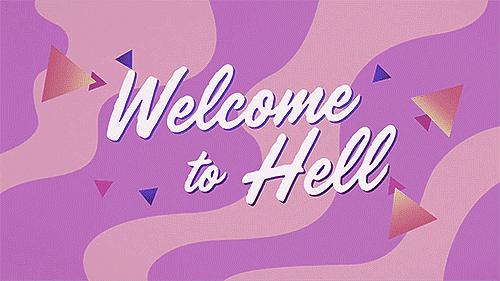
Like any useless writer, I cope by writing out my feelings so here, have this.
I can see why some feel the ending narratively works in some respects, and in some ways I can even agree it can be read in certain ways that make it work. But I also think a happy ending could have been just as narratively excellent, depending on the execution, and my personal opinion is that this would have been a more responsible ending. But no one has to agree, and I understand why people hate the ending and why people defend the ending.
I’m going to talk about this in a few segments: authorial statements, social messages, and genre. (I’m writing another meta on the narrative themes of the ending because that section got massively long.) For what it’s worth, a story does not exist in a vacuum, and while it’s absolutely valid to interpret and critique a story according to simply the written story, it’s also valid to weigh authorial intent (or to dismiss it), and to evaluate how the story plays into both larger cultural messages and larger literary trends. Any author 100% knows that their story will be interpreted according to all of these. But what follows is mostly my opinion/explaining why I feel as I do. It is not me saying anyone has to feel or interpret it the same way.
Authorial Statements
I know Yoshida has made… contradictory and, frankly, offensive statements on the ending, in which she’s said things such as that Ash narratively had to die because he was a murderer and people who kill need to pay with their own lives. In general, Yoshida seems to struggle in interviews–like saying she hates Yut-Lung when the story’s moral center character (Sing) literally tells him in his last scene “I can’t hate you” and promises to help him redeem himself. This is hardly unique to her. It’s hard to explain a complex element of story in a few sentences of an answer. Ishida’s first interview after the end of TG had some cringeworthy moments, Rowling seems to make constant missteps (and retcons), etc. Hence, I generally employ “death of the author”–I think the author’s intent matters to the extent their work conveys their intent, but not if their work contradicts what they then say.
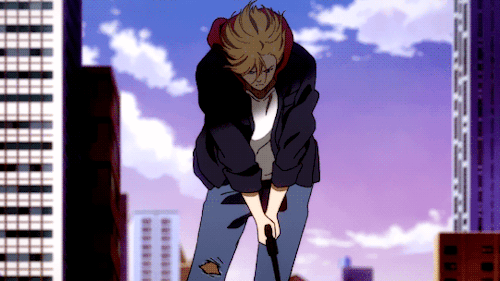
The entirety of Banana Fish contradicts this idea of murderous karma. In fact, the story is at its core about finding a way out of a violent cycle, of finding freedom. Ash dying with a smile on his face literally says that he did not die trapped in a system of karmic violence with no hope of freedom.
Not to mention Sing is a murderer. Yut-Lung* is a murderer. Blanca is a murderer. They all live, and get hopeful (even happy-ish) endings and implied redemption for Yut-Lung and for Blanca.
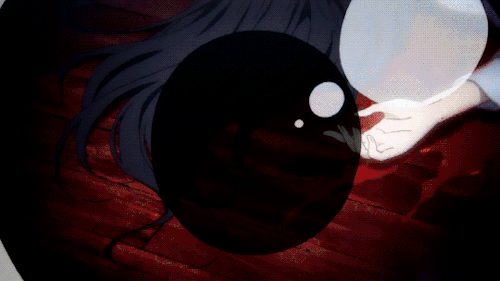
*I know Yut-Lung is name-dropped as having been assassinated in a later manga called Yasha but like, he never actually appears in Yasha and it has nothing to do with his character’s arc in Banana Fish, so I don’t think it’s relevant to anything relating to Yut-Lung’s character as we know him. It’s really just an Easter egg, and since Yut-Lung dying in Yasha is a retcon of the fact that his arc ending with him living in the main story (Banana Fish) I feel completely free to disregard it as not actually canon.*
Additionally, Banana Fish takes empathetic looks at children who are suffering in a world where they are forced into the roles of prostitutes and killers, and what’s the point of empathy if it can’t change anything? Eiji is noted to basically be walking empathy, having a gift for comforting those around him, and the mutual, spiritual, and yes, romantic, love he and Ash share changes things for Ash (and for Eiji). To say that death had to happen narratively is to say that Eiji was, in the words of his critics, useless, which is rather at odds with the central emotional draw of the story: Ash and Eiji’s relationship. It contradicts Eiji’s beautiful letter, the one that Ash smiled as he died because of, because in this letter Eiji assures Ash: “you can change your destiny.”
So anyways, regardless of what Yoshida says, Ash being a murderer is not a narrative justification for the ending because that simply isn’t what the story conveys.
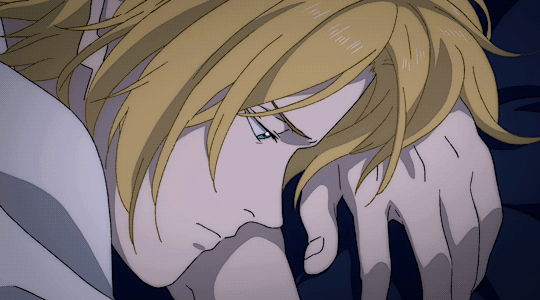
That being said, that perspective–that Ash’s death is karma for killing–is exactly Ash’s perspective. Just when he was about to overcome his flaw of not seeing his value by realizing how much he meant to Eiji, Lao reminds him of Shorter’s death, the one thing he cannot forgive himself for. And so Ash allows himself to die. But the thing is this perspective is wrong and narratively condemned. Eiji’s letter offers a counter to this, but Ash doesn’t take it (which is slightly inexplicable). Plus, as we see in “Garden of Light,” it leaves Eiji unable to completely overcome his flaw (an inability to act/truly live) for seven years, so the story condemns it too.
And, of course, Ash also did not kill Shorter out of malice–he was forced into it, like he was forced into the life he had to live with Dino. It’s not the deaths of one of the people begging to be spared whom Ash killed for playing a role in killing Shorter, but Shorter’s death itself that brings about fear and mistrust in Lao. To have Ash’s death be a consequence for killing willingly (which he did plenty of), it should have been for one of those nameless people we got a brief shot of, instead of as a consequence for a murder Ash had no choice in and was a victim of almost as much as Shorter was. But that also wouldn’t work because a nameless death doesn’t quite suffice for offing your main character, so. Yeah. Ash’s death is not a narrative consequence for killing others; it’s expressly framed as a tragic and cruel result of his inability to forgive himself for specific acts that were not his fault.
Social Messages Part 1: LGBT relationships
While Banana Fish was written in the 1980s-90s (kind of a dire time for LGBT+ people in the United States with the AIDS crisis), the trope of “bury your gays” has received rightful criticism since, and the ending can definitely be seen as “bury your gays.” (A criticism that is not helped by what happens to the gay/bi character in Yasha.) In other words, while I think the themes, characters, and frankly issues of Banana Fish are generally timeless, the ending is the only part of the story that I don’t think ages well. As time goes by, it will probably get even more criticism because of current society finally moving towards being better in the portrayal of LGBT+ characters.
*Because I want to complain and explain why I really don’t consider anything post-GoL canon: the follow-up picture book “New York Sense” doesn’t help the “bury your gays” impression either: Sing and Akira are certainly intended to be parallels to Ash and Eiji as Akira is brought to the US by Ibe and interacts with gangster Sing in “Garden of Light,” and while such framing is very ambiguous/bordering on not being there in GoL the follow-ups absolutely paint a romantic framing to their interactions in GoL. They marry and raise a son, popping up in cameos in Yoshida’s other works. Hence it runs dangerously close to reading as the heterosexual couple introduced in the epilogue got the happy ending while the gay couple we spent 19 volumes with did not. Since Sing is also still heavily involved with the mafia in all of the follow-ups, this again contradicts narrative justifications for Ash’s death as karma.
While I very much like Akira’s character, her romance with Sing isn’t just uncomfortable because of the above issue–it’s also uncomfortable because she is 13 and he is 23 in GoL (though their relationship doesn’t have to be read as mutually romantic there, and I don’t read it that way) and according to “New York Sense,” they marry when she is 18 which… implies things that seems very, very out of character for Sing, the series’ moral compass, and dramatically contradicts the skeevy adults preying on kids theme. It can also raise some cringe-worthy questions about why it’s framed as okay for the heterosexual couple but negatively (as it should be) for the people–who are primarily men–who assault Ash (and there is noted to have been a woman who assaulted him in “Private Opinion”). Like with Yut-Lung’s death, I just… don’t accept this retconning as canon. It contradicts the themes of Banana Fish as a story so I don’t have to.*
Social Messages Part 2: Abuse Survivors
For people who have been through abuse similar to Ash’s, in which choices over basic things like life, death, and your own body are taken from you, it’s honestly cruel to show someone who has spent their entire life suffering just about to grasp happiness, and then they die. It is fully valid to find this completely distasteful, and I do too.
But for me at least, one aspect that circumvents… some of the distasteful implication that Ash really was broken by things he had no choice in is the fact that Ash triumphed over his abusers first. Yet of course, having him die afterwards still hurts people who read the story and see themselves in a character like Ash, as it can reinforce the idea that abuse defines your life.
I do wish (though I don’t think there’s a moral necessity) that more authors/creators would acknowledge that, in creating characters whom you in theory want people to relate to, see themselves in, root for, care about, you’re asking people to suffer with them as they suffer and if they die, grieve for them. Given the heaviness of Ash’s arc and the specific nature of his suffering (especially since it was horrifically emphasized in the story’s last arc with Foxx), the fact that Ash didn’t in the end overcome the message that he did not have value is going to be very painful for readers/viewers. (Lao missed his vital organs, so Ash really chose to die instead of getting help, because he chose to believe Blanca over Eiji, which… I’m not sure it quite works.) If you could have narratively had it end happily (and it absolutely could have, and apparently Yoshida’s editor told her not to end it with Ash’s death), there’s room to say that going with the tragic ending is hurtful and bordering on irresponsible.
Genre
That defeat of Ash’s abusers is the reason I don’t think Banana Fish is quite as tragic as other stories like, say, the first Tokyo Ghoul or Hamlet or Macbeth, though it’s certainly tragic. In those stories, every single characters’ flaws lead to them dying, and it offers a cautionary tale. Banana Fish is more in the vein of say, Romeo and Juliet, or even the movie Titanic (I’m not making a romance comparison, for the record), in that the main characters might die, but their choices and the people they loved and how they loved manage to save a city, in the case of Romeo & Juliet, or to save Rose in the case of Titanic. In Banana Fish, Ash did help Eiji live, even if Eiji would need time to process it after the set-back of Ash’s death.
In other words, even if I’m unhappy with it and I am, I don’t consider Banana Fish’s ending nihilistic. It wasn’t “life sucks and then you die,” at least not to me. Life sucked, but it also meant something, even beyond Ash’s relationship with Eiji. Ash’s life had value. Through saving Sing in the story’s climactic battle, and then helping Max with that article that would save other child prostitutes, Ash saved younger versions of himself. That’s powerful. Not only that, but Ash found love and hope in his personal life as well with Eiji, Max, Shorter, etc., and through that genuine happiness. Even if he couldn’t fully grasp it, he knew it was there, and he died knowing there was genuine, true love, and therefore beauty, in the world too. And that, for me, comes across as far more hopeful than surface-level, cheaper happier endings. But still, the fact that Ash couldn’t fully experience this beauty and happiness because of the cycle of violence he had no choice about being involved in, plus a questionable character decision, does leaves a bitter taste in my mouth. (That questionable character decision, with the letter not having a full effect, makes tragedy seem a bit forced on Yoshida’s part.)
I want to quote Arthur Miller’s “Tragedy and the Common Man,” and I’ve highlighted parts I think explain how I feel about Banana Fish and Ash’s character (in particular, why I don’t think a tragic ending necessarily sends a nihilistic message, at least not to me):
The Greeks could probe the very heavenly origin of their ways and return to confirm the rightness of laws. And Job could face God in anger, demanding his right and end in submission. But for a moment everything is in suspension, nothing is accepted, and in this sketching and tearing apart of the cosmos, in the very action of so doing, the character gains “size,” the tragic stature which is spuriously attached to the royal or the high born in our minds. The commonest of men may take on that stature to the extent of his willingness to throw all he has into the contest, the battle to secure his rightful place in the world.
There is a misconception of tragedy with which I have been struck in review after review, and in many conversations with writers and readers alike. It is the idea that tragedy is of necessity allied to pessimism. Even the dictionary says nothing more about the word than that it means a story with a sad or unhappy ending. This impression is so firmly fixed that I almost hesitate to claim that in truth tragedy implies more optimism in its author than does comedy, and that its final result ought to be the reinforcement of the onlooker’s brightest opinions of the human animal.
For, if it is true to say that in essence the tragic hero is intent upon claiming his whole due as a personality, and if this struggle must be total and without reservation, then it automatically demonstrates the indestructible will of man to achieve his humanity.
The possibility of victory must be there in tragedy. Where pathos rules, where pathos is finally derived, a character has fought a battle he could not possibly have won. The pathetic is achieved when the protagonist is, by virtue of his witlessness, his insensitivity, or the very air he gives off, incapable of grappling with a much superior force.
Pathos truly is the mode for the pessimist. But tragedy requires a nicer balance between what is possible and what is impossible. And it is curious, although edifying, that the plays we revere, century after century, are the tragedies. In them, and in them alone, lies the belief-optimistic, if you will, in the perfectibility of man.
This applies to basically all tragedy, of course, but I think some tragedies are more hopeful than others. And I see that struggle in Ash’s, and a hope in Banana Fish that I don’t see in other more nihilistic stories. Ash fought to reclaim the humanity that people tried to deny him, and through Eiji realized his humanity was there all along.
Anyways, these are my complicated, all-over-the-place feelings on the ending. It’s fine for people to feel strongly either way, but also understand that when discussing such a heavy, fundamentally triggering work, it’s good to be sensitive to where people are coming from and interact with differing opinions with empathy. Many of us relate to characters like Ash, Eiji, and Yut-Lung, and since you don’t know where someone is coming from, let them express their feelings, and be kind.
I’ll post another meta on thematic impressions on Banana Fish later. But to each their own. Also please note, again, this is really just my opinion.
#finally a well argued piece on why bnnf's ending wasn't necessarily great#that's not just self indulgence :O#meta
635 notes
·
View notes
Text
why banana fish is not bury your gays:
1. yoshida had planned ash’s death from the very beginning, back when eiji was originally written as a female. eventually, she decided to make eiji a male instead because she thought a heterosexual couple would be too boring. in other words, eiji’s gender had nothing to do with yoshida’s decision. she goes on to debunk the misconception that she killed ash because lgbt should not survive and be happy in this interview.
2. take into consideration that banana fish was released in 1985. old japanese movies often ended with the main character dying. the hero dies was a popular trope back then, and still is somewhat today.
3. ash did not die because he was bisexual and in love with a man. ash died because he was fighting against the operations of not only the corsican mafia that had him under their hold in sex trafficking, but a corrupted united states government and military force partnered with the black market that wanted to utilize a dangerous hypnosis drug such as banana fish for their own agendas. yut-lung, an ally to the corsican mafia at the time and drowning in his own demons, took advantage of lao’s hatred for ash and manipulated him into thinking the only way to save his little brother was to kill him. ash then let himself peacefully bleed out after reading eiji’s tender letter, almost as if he was saying “it’s enough.” this is because despite eiji’s love having given him genuine happiness, that alone cannot erase 8+ years of continuous rape and abuse without any form of professional help. his reason for living this long in the first place was because he needed to get revenge, which he did in the end. his behavior and thoughts alluded to suicidal ideation multiple times throughout the series. claiming the above would not only be insulting, but a downplay on ash’s suffering.
4. to further explain this, it’s important to note akimi yoshida pulled most of her inspiration from classic novelists focused on tragedy, specifically j.d. salinger, scott f fitzgerald, and ernest hemingway. two of these novels named islands in the stream and for whom the bell tolls by ernest hemingway, which are actually seen in the anime, contain these passages:
“He thought that on the ship he could come to some terms with his sorrow, not knowing, yet, that there are no terms to be made with his sorrow. It can be cured by death and it can be blunted or anesthetized by various things. Time is supposed to cure it, too. But if it is cured by anything less than death, the chances are that it was not true sorrow."
“For in such things the bad ending, failure, could not be ignored. It was not simply a possibility of harm to one’s self, which could be ignored. He knew he himself was nothing, and he knew death was nothing. He knew that truly, as truly as he knew anything. In the last few days he had learned that he himself, with another person, could be everything. But inside himself he knew that this was the exception. That we have had, he thought. In that I have been most fortunate. That was given to me, perhaps, because I never asked for it. That cannot be taken away nor lost.”
although controversial, it is not difficult to understand the messages of true sorrow and love yoshida wanted to show us through ash’s tragic death.
5. shorter was killed with banana fish, skipper was shot and killed, griffin was shot and killed, jessica was raped, sing’s brother was shot and killed, jennifer was shot and killed, yut-lung was assassinated, eiji was shot twice and almost died, etc. there were endless deaths and prices paid in banana fish. everyone was at stake once involved.
6. mappa was kind enough to not animate garden of light, the after story which confirms ash’s death in the manga. they left the anime open-ended intentionally and stated that whether ash is really dead or still alive is for viewers to decide, so either or is confirmed canon. additionally, ash is not deceased like lao is shown to be on the website charts.
7. from beginning to end, this show was very obviously about a character who suffered horrifically through the cruel acts of others, regardless of his gender or sexual orientation. it was about corruption and the ignorance of criminal justice powers meant to help child victims. it was never about ash’s growth or his happy ending. life often isn’t fair. we were simply witnesses to his raw, powerful story.
359 notes
·
View notes
Text
#i made two sets of matching icons as well
ooh yes i’d love to see icons!! also do u need tissue
somebody to talk to me about banana fish pwease
i just finished it and i’m sad
34 notes
·
View notes
Text
so exactly one week after watching the anime i began to read the manga because i heard there were additional scenes and dialogue, which really pleased me, and then i got to the final volume which i had put off for days until i finally found the guts to open it and hey hello, depression!
i have a lotta thoughts i need to get out, but they’re big ass spoilers for the last ep/volume, so they’re under the cut.
i’ve heard a lot of things about the ending, whether or not the author was right to have written it that way, but i discovered the tragedy was strangely cathartic for me. i thought about this for days- i mean, all this time i wanted our protagonist to find peace away from the demons that had haunted his life (and he’s so young too). for him to die of a stab wound from an unresolved conflict with an enemy who wasn’t even that important in the plot, for him to choose to bleed out in his sacred space of the new york public library instead of seeking help… it’s hella bleak, man.
i can understand where fans against this ending come from. i think a lot of readers see themselves in ash lynx. sure, i doubt we’d find ourselves in the middle of prostitution rings where insane pedophiles make you murder your best friend after injecting them with mind controlling drugs (damn did this fuck me up good), but banana fish’s depiction of the trauma from sexual assault and of the way your childhood can cling to you no matter what you do… it’s raw and real, like an amplified version of experiences many readers may have gone through. we want him to get a happy ending, i think because we also want a happy ending for ourselves.
what had been inspiring to me was ash’s spirit throughout the show. he’s always tried so hard, done his best to become more than a product of his circumstances. in the final volume, eiji’s letter begged him to change his fate, hell, almost every character rooted for him to stay alive, but in the end, he didn’t fight to live on. i don’t know if it’s exactly considered suicide (such a gray area…) but i see how it can be perceived as such. i tried to find meaning in it. was life really that hopeless, for one to struggle so much, only to die alone at the age of 18?
i came across this essay on the ending (super recommended read). the short of it was that ash, despite having loved his friends and family with all his being, didn’t manage to understand how to live for himself in the end, which makes it such a gut-punching tragedy. it was the emotional impact of it which drove in the point of loving yourself. (so weird, huh, that a comic involving gangs, drugs and rape is primarily about love, in all its different forms.)
the reader may have followed ash lynx, walked in his shoes and felt his pain, but we are not him. the way i interpreted it, the tragedy in banana fish warns us not to be, and it does so especially in garden of light, which showed us the people who were left behind, years after his death. life went on, sure, but the process of moving on is a whole other story. it’s the same among us fans, too. lots of us think: “if only he’d saved himself” “if only he had a happy ending” and i think it is only in these sort of thoughts where we can grasp the author’s message. only by ending banana fish in tragedy could this message have been most powerful, echoing more strongly through our hurt than a happy finale ever could. the lingering pain makes us remember it.
ash lynx had a tragic life. nobody wishes his journey upon anyone else, but i think that’s the power of fiction. he’d died young, suffered young, but through his story, there was something about him that was so alive. he’d loved others and found someone who’d loved him; when he felt his emotions - from happiness and anger to pain and fear - he felt them strongly, and it was in my experience of following him that i felt i was not alone. there was a strength to him when he fought to survive that we could emulate, i think, because i too wanted to have a spirit as alive as his. yet, from my position as the reader, i could take away from his death a greater understanding of what it means to live.
it’s all about how we choose to see the ending, i think. in this world, it can be cruel - souls as bright as ash’s could be snuffed out within minutes, but at the same time this means it’s all the more important to love yourself as you are now. you could’ve gone through horrors, you could feel like you’re someone who cannot be saved, maybe you feel you have done irredeemable things, or maybe you could’ve had a not so dramatic life so far. but regardless of our fortune or sins, we are human and it is in the human experience - or one might say, only natural - in loving other beings.
and even if we have not experienced such love or have had the fortune of being loved, there is importance in finding the strength to place this love upon ourselves, no matter our flaws - that’s what it means to be alive.
Posted 1 month ago with 20 notes
Tagged with #
banana fish
#
i need to stop babbling about this franchise but damn do i feel like i've got a knife in my gut
#
but hmm writing this has let me go from the fourth to final stage of grief lmao
#
hmu about banana fish plz i love this story so much
1 note
·
View note
Text

I miss them
724 notes
·
View notes

